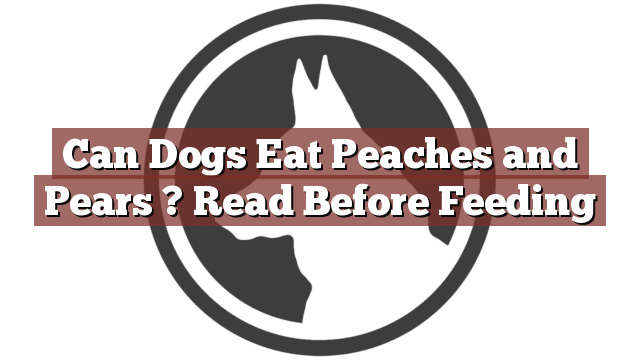Understanding Your Dog’s Dietary Needs
As a responsible dog owner, it is crucial to understand the dietary needs of your furry friend. While dogs are primarily carnivorous, they can also benefit from a well-balanced diet that includes fruits and vegetables. However, it is important to remember that not all human foods are safe for dogs. Some fruits, such as peaches and pears, may seem enticing to share with your pet, but it is essential to know whether these fruits are safe for canine consumption.
Can Dogs Eat Peaches and Pears? Read Before Feeding
Can dogs eat peaches? Yes, they can. Peaches are safe for dogs to eat in moderation. They contain essential vitamins and minerals that can be beneficial to your dog’s health. However, it is crucial to remove the pit and skin before feeding peaches to your pet. The pit contains cyanide, which is toxic to dogs and can cause serious health issues. Additionally, the skin can be difficult for dogs to digest and may cause gastrointestinal discomfort.
Can dogs eat pears? Yes, they can. Pears are also safe for dogs to eat in moderation. They are a great source of vitamins C and K, as well as fiber. However, similar to peaches, it is important to remove the seeds and core before feeding pears to your pet. The seeds contain small amounts of cyanide, which can be harmful to dogs if consumed in large quantities.
Pros and Cons of Feeding Peaches and Pears to Dogs
Feeding peaches and pears to your dog can have its pros and cons. On the positive side, these fruits are low in calories and can be a healthy alternative to processed treats. They also contain fiber, which can aid in digestion and promote a healthy bowel movement. Moreover, the vitamins and minerals present in peaches and pears can contribute to your dog’s overall well-being.
However, it is important to keep in mind that not all dogs may tolerate these fruits well. Some dogs may experience digestive issues such as diarrhea or upset stomach if they consume too much. Additionally, the sugar content in fruits like peaches and pears should be monitored, especially if your dog has certain health conditions such as diabetes or obesity.
Conclusion: Making an Informed Decision for Your Dog’s Health
In conclusion, peaches and pears can be safely consumed by dogs in moderation. However, it is essential to remove the pits, seeds, and skin before feeding these fruits to your pet. As with any new food, it is recommended to introduce peaches and pears slowly to monitor your dog’s tolerance and any potential adverse reactions. Always consult with your veterinarian if you have any concerns or questions about your dog’s diet. By making informed decisions about your dog’s nutrition, you can ensure their overall health and well-being.
Thank you for taking the time to read through our exploration of [page_title]. As every dog lover knows, our furry friends have unique dietary needs and responses, often varying from one canine to another. This is why it's paramount to approach any changes in their diet with caution and knowledge.
Before introducing any new treats or making alterations to your dog's diet based on our insights, it's crucial to consult with a veterinarian about [page_title]. Their expertise ensures that the choices you make are well-suited to your particular pet's health and well-being.
Even seemingly harmless foods can sometimes lead to allergic reactions or digestive issues, which is why monitoring your dog after introducing any new food item is essential.
The content provided here on [page_title] is crafted with care, thorough research, and a genuine love for dogs. Nevertheless, it serves as a general guideline and should not be considered a substitute for professional veterinary advice.
Always prioritize the expert insights of your veterinarian, and remember that the health and happiness of your furry companion come first.
May your journey with your pet continue to be filled with joy, love, and safe culinary adventures. Happy reading, and even happier snacking for your canine friend!

